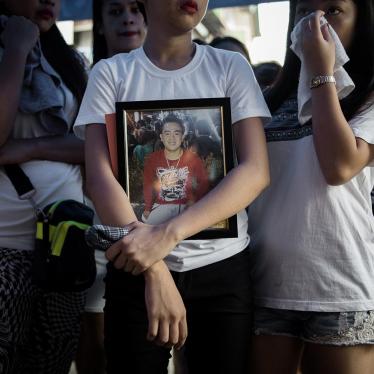The Egyptian government’s decree dissolving one of the country’s leading human rights organizations is an affront to freedom of association, Human Rights Watch said today. Human Rights Watch called on Egyptian authorities to reverse their decree closing the Association for Human Rights Legal Aid (AHRLA).
On September 4, Cairo governor `Abd al-`Azzem Wazeer issued a decree shutting down AHRLA, which reports on human rights violations and provides legal assistance to victims. The decree cites article 17 of the Law on Associations (84/2002), which bans nongovernmental organizations from receiving foreign funding without prior government permission.
“Although Egypt is a member of the UN Human Rights Council, it is preventing its citizens from maintaining an association that combats human rights violations,” said Joe Stork, deputy Middle East director of Human Rights Watch. “This outrageous order shows that President Mubarak’s government is more interested in obstructing than protecting basic rights.”
The governor’s decree appointed an official receiver (mosafi qada’i) to take control of the association’s assets. The official receiver went to AHRLA’s offices on September 16, accompanied by about 10 plainclothes State Security Intelligence officers and over 100 central security forces. Security officials confiscated the group’s checkbooks in order to implement the dissolution. The receiver told AHRLA that he will take full control of their offices and assets on Tuesday, September 18.
AHRLA’s board chairman, Tarek Khater, who is a founding member of the organization, told Human Rights Watch that the grants in question date back to 2003 and 2004. The donors include the Canadian International Development Agency, the Swiss Embassy in Cairo, and the US-based National Endowment for Democracy. AHRLA requested permission from the Ministry of Social Solidarity to accept the grants, as required by law, but finally proceeded to use the funds after ministry officials repeatedly delayed giving approval.
“The government can reasonably require a local civil society organization to comply with customs and foreign exchange regulations when it accepts funds from abroad,” Stork said. “But the Egyptian authorities have set up obstacles that unnecessarily infringe freedom of association.”
AHRLA has appealed the decree before the Administrative Court, and a hearing has been set for October 21.
The government move to shut down AHRLA follows its closure of the Center for Trade Union and Workers Services (CTUWS), which offers legal aid to Egyptian factory workers and reports on labor-rights issues in the country. The government blamed the group for inciting labor unrest. On April 25, security forces closed the CTUWS headquarters, following the closure of its branches in the Nile Delta town of al-Mahalla al-Kubra on April 11 and in the southern industrial town of Naga` Hammidi on March 29.
In a July 2005 report on Egypt’s Law of Association, “Margins of Repression”, Human Rights Watch called on Egypt to amend the law to establish transparent accountability mechanisms and eliminate excessive state powers to police and stifle the work of civil society organizations.






